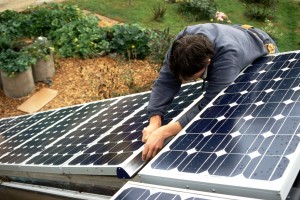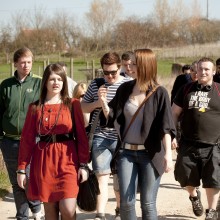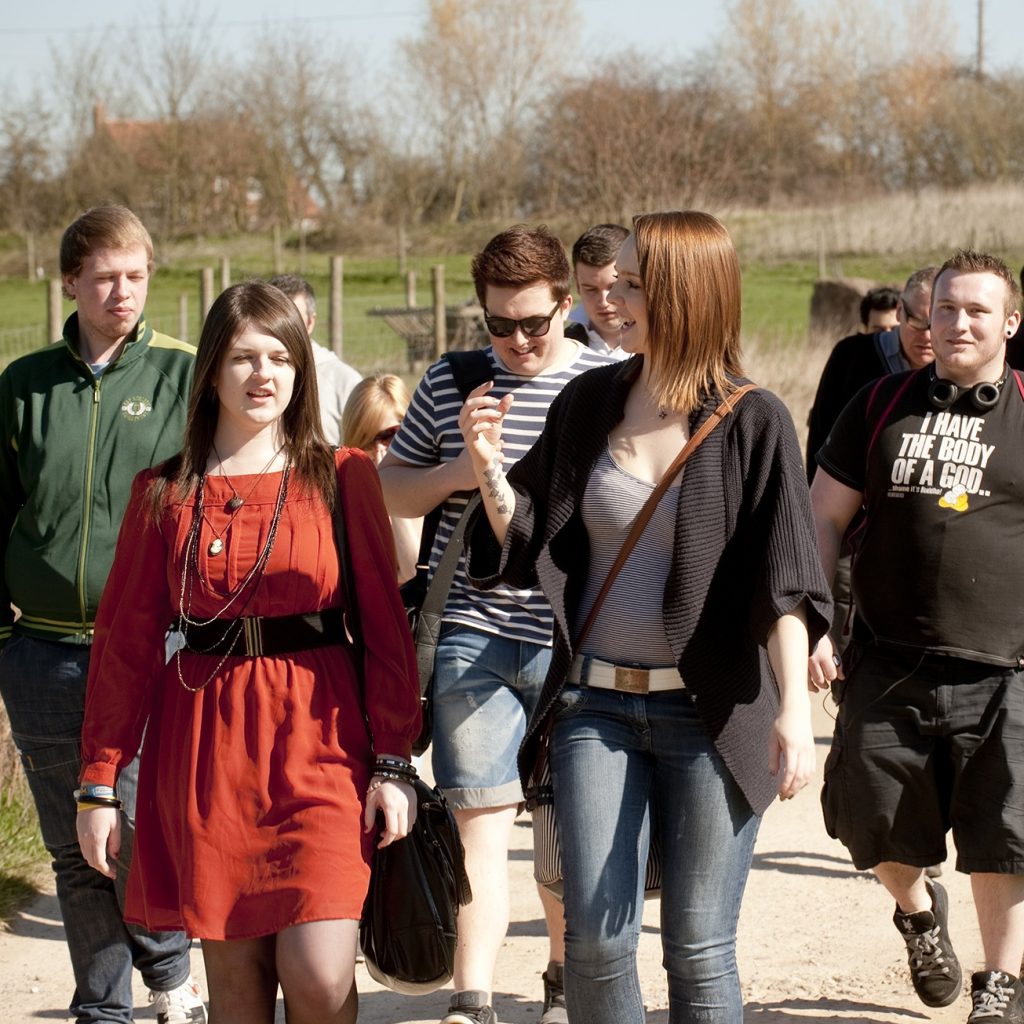- Do you want to help improve the energy efficiency of homes in your area?
- Are people in your community struggling to pay their energy bills?
- Confused by the Green Deal and ECO? Not sure what other forms of funding are out there?
On 15 March 2014 Hockerton Housing Project is hosting a free training event for the Community Climate Action Network that will help you to help your community adopt energy efficiency, lower their energy bills and cut their carbon emissions.
- Try out practical tools for assessing how your community can best lower the carbon footprint of their homes and reduce their energy bills.
- Hear about inspiring projects in other communities.
- Find out about funding to help households install energy efficiency measures such as solid wall insulation, new boilers and renewables.
- Find out how you can lower energy use in community buildings.
For further information please contact Caroline Harmon: ccan@mea.org.uk / 07748 508704.
The event will end with a Bring Your Own Lunch and the option of a tour of the Project. This must be booked separately and there is a charge.

Hockerton Housing Project is looking for community energy projects who want to learn from our experience, to take advantage of a new Mentoring Fund.
The scheme is only open to applicants until 12 December 2013, but successful applicants will receive support through to March 2015. It’s a rare offer of funding for community projects that aim to:
· Generate energy
· Reduce energy use, and/or
· Manage and purchase energy
We have a range of experience to share, in terms of scale and technologies, in energy generation, reduction and management. And we are experienced in mentoring a range of projects, having run a similar service through the Energy Saving Trust, as well as our current advisory services.
We would be particularly keen to partner with multiple organisations to improve the cost-effectiveness of our application, with the programme starting with a joint workshop here at Hockerton before moving on to a mix of one-to-one support, community outreach and shared learning initiatives.
Find out more about the fund here, noting the eligibility criteria. If you are interested in the mentoring scheme please get in touch by 2 December, telling us a little about your organization and what you are trying to achieve in the next 18 months.
We look forward to hearing from you!
The HHP team
 South Brent’s community-owned Vestas V27 started production last week and 10th September sees 2355kWh on the clock.
South Brent’s community-owned Vestas V27 started production last week and 10th September sees 2355kWh on the clock.
It is great to this project go live, as it is very similar to our local Sustainable Hockerton turbine, which is also fully community owned, and we have close links to one of the Directors who is also a member of our scheme! We wish them every luck and success as the commissioning process gets under way.
Is it possible that we will now we start to catch up with the Danes where back in 2001 over 100,000 families belonged to wind farm cooperatives installing over 86% of the countries wind turbines? In Germany the national figure is 50% but in some regions 90% of installed wind capacity (700MW) is community owned1.
Power to the people!
1 Renewable Energy Focus Volume 14 issue 4
If this property’s share in a community-owned wind turbine were taken into account, it would have the lowest energy use and CO2 emissions of all properties in the recent Retrofit Revealed report.

Two of HHP’s retrofit projects were included in a recent report by the Technology Strategy Board, and whilst the published results look good, they are not the full story due to the role played in our design by off-site renewable energy.
The Technology Strategy Board (TSB) funded the Retrofit for the Future competition to encourage innovation in the retrofit market and understand what actually works. 87 projects were awarded up to £150k each to retrofit social housing units, aiming to achieve an 80% reduction in CO2 levels compared to 1990 averages. HHP won funding for a project to retrofit 2 semi-detached houses in Newark, Notts, which have now been re-occupied for over 2 years.
The TSB has recently produced a report, Retrofit Revealed, providing the first analysis of data from the monitoring of 37 of the projects.
As we had split the (not inconsiderable) budget between two properties, we were pleased to see that one of our retrofitted houses (property number TSB023) still had the 8th lowest level of CO2/m2 (3rd best of the all-electric properties) whilst the other (property number TSB022) was a credible 26th. In terms of total energy use (per m2), our properties were 4th and 12th respectively. This shows the impact of being an all-electric property, as electricity has a much higher carbon intensity than gas; and the impact of resident behaviour, as the houses are built and retrofitted to identical specifications.
Our choice of going ‘all-electric’ was deliberate: it is not a finite resource like gas; and because our design off-set that electricity use through investment (from the project budget) in a local community-owned wind turbine.
The impact of this investment is not recognised by the TSB report but it has proven much more cost-effective and a lower maintenance approach than on-site renewables. Analysis of the energy data for Property TSB023, for which we have 2 years of meter readings, shows that if its share of SHOCK turbine generation were taken into account, it would have the lowest energy use and CO2 emissions of all properties. A £1,500 investment offset 43% of the annual energy use, and at the same time the social landlord has a regular income rather than a maintenance overhead.
This offsite offset would not be recognised in the properties’ Energy Performance Certificates (EPC) either. This matters because the Government said in their Energy Efficiency Strategy that it intends to make more policies conditional on energy efficiency. Onsite renewables would be recognised, but what about all those unable to install systems onsite due to property type, leasehold or planning restrictions? Or simply unable to afford an onsite system at higher upfront cost per kW?
Further key aspects of our design (passive solar gain, high thermal mass and buffer zones) are not fully recognised by SAP, the Government’s assessment tool, and so similarly the benefits would not be fully registered in the EPC.
Here’s hoping that TSB take a technology-neutral look at the results and feedback into SAP what really works for different properties, and their residents.
 Hockerton Housing Project has been hosting tours for over ten years, showing over 20,000 people around the Project and its homes to help them understand how homes and communities can meet the energy and environmental challenges of the 21st century.
Hockerton Housing Project has been hosting tours for over ten years, showing over 20,000 people around the Project and its homes to help them understand how homes and communities can meet the energy and environmental challenges of the 21st century.
The most frequent visitors come from our local universities in Nottingham, Derby, Sheffield, Loughborough and Lincoln but we’re keen to see more – both from other universities and from a greater range of courses. Our Project is not just about the housing or the technical infrastructure; it can be used to illustrate a range of studies including the politics of communities and the role of sustainability in health services.
Feedback suggests a visit to us can really inspire students…
Thanks again for a great day and for inspiring my students!
Reader in Environmental Geography, Geography Department,University of Leicester
It was a super experience and the students were buzzing all the way home.
Associate Professor, School of Politics and International Relations, University of Nottingham
Many thanks for another superb visit. It gives the students a real insight into the options for more sustainable living and really gives them something to think about.
Queen Elizabeth High School for Girls
I’d just like to thank you personally for inviting us in your homes and inspiring future generations with your amazing work. It was such a productive experience as we got to see everything we’ve been taught in our module in real life. I thought it was all just theory but to see it up and running and so successful gave me great joy.
Engineering student, Loughborough University
We’ve prepared a short guide to these visits for lecturers and teachers, and are keen to hear from lecturers how you think we could help you bring sustainability to life in your classroom or through a visit to Hockerton Housing Project.








